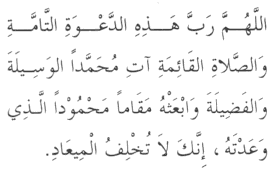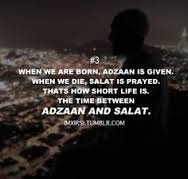-
Posts
8,434 -
Joined
-
Days Won
771
Content Type
Profiles
Forums
Events
Everything posted by ummtaalib
-
Virtues of Sabr Sabr - Most Precious Gift to a Mu'min One of the great results and precious fruits of our freedom and emancipation from servitude to our carnal self is patience in calamities and misfortunes. In other words, Sabr means restraining ourselves from complaining about hidden anguish. Sabr produces many excellent results, among which is the soul's training and discipline. Sabr in regard to obedience [ta'at] is the source of intimacy with Almighty Allah Jallah Wa'ala. And Sabr in misfortunes is the source of rida or contentment with Divine destiny and decrees. These are the stations of the faithful [ahl-al-Imaan] or rather those of the Gnostics [ahl-al-Irfan]. It is said that Sabr is to faith what the head is to the body. The body perishes without the head, and so when Sabr goes faith also disappears. The accounts of the lives of the Ambiya Alayhim Salaam from Nabee Adam Alayhis Salaam to our Beloved Nabee Muhammad Sallallahoo Alayhi Wasallam reveal that although their stations were over and above the stations of Sabr, rida and taslim [surrender], they never stopped supplicating, lamenting and confessing their needs to Almighty Allah Subhanahu Wata'ala and this is not contrary to their spiritual stations. Remembering Almighty Allah Azza Wajjal, cherishing the intimacy of solitude with the Exalted Beloved, and expression of servitude and humility in front of His absolute perfection and greatness is the ultimate end of the hopes of the mystics [arifun] and the final destination of the journey of the wayfarers [salikun]. Sabr is the key to the gates of felicity and the main means of deliverance from the mortal perils. Sabr makes a human being bear calamities with ease and face difficulties with composure. Sabr strengthens the will and the power of resolution. Sabr brings independence to the dominion of the soul. Anguish and anxiety on the other hand, aside from their shameful character, are symptoms of the soul's weakness. They deprive one's being of its stability, weaken the determination, and enfeeble the intellect. "Sabr restrains the inner being from anguish, the tongue from complaint and the bodily members from untoward movements." There are various degrees and levels of Sabr, and its reward and merit vary in accordance with its degree and level. This is revealed by the following tradition as narrated by Hazrat Ali Radhiallahu Ta'ala Anhu: Hazrat Ali (Radhiallaahu Anhu) said: "The Messenger of Almighty Allah Azza Wajjal said, Sabr is of three kinds: Sabr in regard to disobedience. One who bears patiently with affliction, resisting it with a fair consolation, Allah writes for him or her three hundred degrees [of sublimity], the elevation of one degree over another being like the distance between the earth and heavens. And one who is patient in regard to obedience, Allah writes for him or her six hundred degrees [of sublimity], the elevation of one degree over another being like the distance between the earth's depths and the Throne [al-Arsh]. And one who is patient in regard to disobedience, Allah writes for him or her nine hundred degrees [of sublimity], the elevation of one degree over another being like the distance between the earth's depths and the furthest frontiers of the Arsh [Throne]." This noble tradition reveals that Sabr in regard to disobedience is superior to the other levels of Sabr, for it not only possesses greater number of degrees but also the range between its degrees is greater than those of the other kinds. It also shows that the extent of Paradise is much greater than what can come into our imagination, for our vision is limited and confined. That which has been said as a description of Paradise that: [part of verse 21 of Surah Al-Hadid] "And a Garden the breadth whereof is as the breadth of heaven and earth." perhaps refers to the Paradise of deeds. That which has been referred to here in this most beautiful verse is the Paradise of character and the criterion in the Paradise of character is the strength and perfection of will. Hence its extent should not be confined within any limits. Almighty Allah Subhanahu Wata'ala informs us with words of wisdom and with the expression of truth in verse 45 of Surah Al-Baqara: "Nay, seek Allah's help with patient perseverance and prayer; It is indeed hard, except to those who bring a lowly spirit." The Arabic word Sabr implies many shades of meaning, which is impossible to comprehend in one English word. It implies (1) patience in the sense of being thorough, not hasty; (2) patient perseverance, constancy, steadfastness, firmness of purpose; (3) systematic as opposed to spasmodic or chance action; (4) a cheerful attitude of resignation and understanding in sorrow, defeat, or suffering, as opposed to murmuring or rebellion, but saved from mere passivity or listlessness, by the element of constancy or steadfastness. Almighty Allah Subhanahu Wata'ala then informs us in Verse 153 of Surah Al-Baqara of the reward awaiting those who display Sabr: "O you who believe! Seek help with patient perseverance and Prayer: for Allah is with those who patiently persevere." What then can be a greater reward for patience, perseverance, self-restraint and constancy than that Almighty Rabbul Ala'meen should be with us? For this promise opens the door to every kind of spiritual wellbeing. The "patient perseverance and prayer" mentioned is not mere passivity. It is active striving in the way of truth, which is the way of Almighty Allah Jallah Wa'ala. If a Mu’min bears patiently with misfortunes and calamities and seriously endures the hardships entailed by worship and rites and the bitterness arising from the renunciation of carnal pleasures, and if he or she does all this for the Pleasure of Almighty Allah Jallah Wa'ala, his or her soul gradually becomes accustomed to these things. The Righteous are patient in Constant Devotion: Almighty Allah's Way is open to all: whosoever has the Will may attain to the Perfect Goal as promised by Almighty Rabbul Ala'meen in verse 12 of Surah Al-Insan: "And because they were Patient and constant, He will reward them with a Garden and (garments) of silk." Almighty Allah Azza Wajjal tells us with words of wisdom in verses 155 - 157 of Surah Al-Baqara: "And surely We shall try you with something of fear and hunger and loss of wealth and lives and crops; but give good tidings to the steadfast. Those who say, when a misfortune striketh them: Lo! We are Allah's and lo! unto Him we are returning, such are they on whom there are blessings from their Lord, and mercy, such are the rightly guided." When something unpalatable happens or we come across troubles or deprivations, we are naturally inclined to resist the onslaught of the happenings, and when resistance be of no avail, we may lose heart. On such occasions Sabr (patience) comes in as a handy remedy prescribed by Almighty Allah Subhanahu Wata'ala, to act as an anti-toxin to the poisons of mishaps. The ordeal is not so afflicting as the sense of it. But when one is accustomed to bear things with Sabr and surrenders oneself to the Will of Almighty Allah Jallah Wa'ala, a great deal of the adverse effect of tribulation vanishes away. "O ye who believe! Seek help in steadfastness and prayer. Lo! Allah is with the steadfast." [surah Al-Baqara Verse 11]. When one mediates over the significance of the above verses that for such unhappy occasions, Almighty Rabbul Ala'meen has prescribed Sabr (patience) as the most handy weapon to ward off evil effects of the mishaps etc; it acts as a neutralizing agent to the poisonous reactions of adverse circumstances. The affliction is not so grueling as the sense of it. But when one cultivates the habit of patience and steadfastly bears things resigning to the Will of Almighty Allah Azza Wajjal, his or her whole psychological set up of mind undergoes a great change. It is a sublime philosophical teaching of Islam that teaches one to resign and surrender oneself to the Will of Almighty Allah Azza Wajjal. When a Mu’min is convinced that "Rabbul Ala'meen - Exalted is with the steadfast", it gives him or her great consolation and comfort. Such contemplation no doubt mitigates his or her sufferings. Thus Sabr is the elixir of all ills and an anti-toxin of all mishaps, hardships and failures etc. The full meaning of Sabr is to be understood here viz.: Patience, perseverance, constancy, self-restraint, refusing to be cowed down. These virtues we are to exercise for ourselves and in relation to others; we are to set an example, so that others may vie with us, and we are to vie with them, lest we fall short; in this way we strengthen each other and bind our mutual relations closer, in our common service to our Glorious and Exalted Creator as shown to us in verse 200 of Surah Al-Imran: "O you who believe! Persevere in patience and constancy; vie in such perseverance; Strengthen each other; And fear Allah; That you may prosper." Prosperity [Falah} in this verse is to be understood in a wide sense, including prosperity in our mundane affairs as well as in spiritual progress. In both cases it implies happiness and the attainment of our wishes, purified by the love of Almighty Allah Subhanahu Wata'ala. Almighty Allah Jallah Wa'ala declares to us in verse 115 of Surah Hud: "And be steadfast in patience; For verily Allah will not suffer the reward of the righteous to perish." A Mu’min must be patient with what seems to be evil all around. That does not mean that we should sit still and do nothing to destroy evil; for the fight against evil is one of the cardinal points of Islam. What we are told is that we must not be impatient. We must pray to our Glorious and Exalted Creator and commune with Him, so that our patience and faith may be strengthened. "Almighty Allah's Grace and Help are ever ready for His servants who patiently persevere. Let not arrogance blind the souls of men. The Hour of Judgement is bound to come. The keys of Life and Death Are in the Hands of Allah. Dispute not the Signs of Allah, but learn from history And the world around you. Science and skill avail you not if the soul is dead." [synopsis of Surah Ghafir Verses 51 to 85]. What then can we do to make Almighty Allah's Light shine forth through the darkness around us? We must first let it shine in our own true selves with that Light in the niche of our inmost hearts we can walk with steps both firm and sure: We can humbly visit the comfortless and guide their steps. Not we but the Light will guide. But oh! The joy of being found worthy to bear the Torch, and to say To our brethren: "I too was in Darkness, Comfortless, and behold, I have found Comfort and Joy in the Grace Divine." askimam
-
It was narrated that Anas (may Allah be pleased with him) said: The Messenger of Allah (peace and blessings of Allah be upon him) said: “Du’a is not rejected between the adhan and iqamah, so engage in du’a (supplication).” [Tirmidhi]
-
Making Dua' After Adhaan. During his recent visit to Zambia, Shaykhul Hadeeth Mawlana Muhammad Saleem Dhorat Saheb Hafizahullah shared a beautiful gem with us! He mentioned that we have been advised by the Prophet salalahu Alayhi wasallam to make Dua' for Him, only once. When is that? After Adhaan! What Dua do we pray? Allahumma Rabba Haathihi da'wati taammati wassalaatil Qaaimati aati muhammadanil waseelata wal fadheelata wab'ath hu maqaamal Mahmoodanillathi wa'attahu. Innaka laa tukhliful mee'aad. O Allah, Lord of this perfect call and this everlasting Salaah, grant Muhammad salalahu Alayhi wasallam the right of intercession and honour and raise him to the laudable position which You have promised him. Surely, You do not break promise. Ever Wondered why the Prophet salalahu Alayhi wasallam chose the time after Adhaan? The Prophet salalahu Alayhi wasallam knew that at this time, Duas are readily accepted, therefore He salalahu Alayhi wasallam chose THIS time!
-
Note that this dua has variations Imam Bukhari (Rady Allahu anhu) related on the authority of Jabir (Rady Allahu anhu) that the Prophet Muhammad said whoever recites the following supplication after the Adhan shall get intercession on the Day of Judgment. The supplication is: اللهم رب هذه الدعوة التامة والصلاة القائمة آت محمدا الوسيلة والفضيلة وابعثه مقاما محمودا الذي وعدته “O Allah! Lord of this complete call and established prayer give Muhammad the position and distinction, and give him the praised station that you have promised. Allahumma hadhihi al-da’wat al-taammah wa al-salaat al-qaa’imah ati Muhammadan al-waseelata wa al-fadeelata waba’th hu maqaaman mahmudan alladhee wa’adta.” (Sahih al-Bukhari 1/160)
-
-
Three Levels of Sabr by Shaykh Husain Abdul Sattar Sabr is a very specific act, and can be defined in three ways: Although sabr has deeper levels, the basic principle of sabr is of sabr fil’musibah (having sabr in the face of difficulty). This is the type of sabr most people understand. This is when you show patience in the event of some difficulty. We all undergo difficulties, but the distinguishing factor is how we deal with them. Some people will get upset and continuously complain, but the believers will see difficulty as an opportunity to worship Allah swt, they will exhibit a calmness and say alhamdulilah (all praise is to Allah) for the chance to come closer to Him. They’ll say innallahi wa ina’ilahi rajioun (from Allah we came and unto Him is our return). Whatever we lost in the difficulty, it came from Allah سبحانه و تعالى anyway so it ultimately doesn’t matter because we all have to go back to Him. Another level of sabr is sabr an’nil masiah (having the sabr to restrain from sin). When the believer is faced with the opportunity to do sin, he will immediately turn away from it. This will require a certain sabr, a certain restraint, because the chance to do sin is all around us. It’s easy to log onto the computer and engage in a variety of sin, it’s easy to sit with two people and talk about a third. The third level of sabr is sabr a’la taha (sabr in the acts of worship). There are inevitably times when a person feels excited to do a certain act of worship. If you’re in the masjid and everyone is praying maghrib, it’s easy to be excited for the one short period of time, but you have to pray maghrib 365 days of the year. To develop a consistency in our routine, to patiently do our good deeds and worship without fail requires a deep sabr. These are the three types of sabr the saalik (the seeker) must work to establish. Everyone is in different circumstances, some people don’t have the strength to pray abundantly, but they are able to be free from sin. Other people are able to face problems with great patience but don’t engage is extra worship. At the least, however, we should all abstain from committing sin. This is the least part of our sabr, and without sabr it will be very difficult to attain mayi’ah. Source
-
Definition From Ma'ariful Qur'an, Volume 1, Mufti Muhammad Shafi rahmatullahi alaih The Arabic term Sabr (sabr) is much more comprehensive than its usual English equivalent, "patience". Lexically, the word "Sabr" signifies "restraining oneself, or keeping oneself under control." In the terminology of the Holy Qur'an and the Hadith, Sabr has three modes:- 1) Restraining oneself from what the Shari'ah has declared to be illegal or impermissible (Haram). 2) Forcing oneself to be regular in the observance of the different forms of worship and to be steadfast in obeying the commandments of Allah and the Holy Prophet Sallallahu 'Alayhi Wasallam: Peace be upon him. 3) To endure all kinds of trouble and pain - in other words, to understand clearly and to believe that it is the will of Allah to make one suffer, and to hope that one shall receive a reward for this suffering. With regard to this last point, let us add that, on the authority of the commentator Sa'id Ibn Jubayr, Ibn Kathir says that if one cannot help uttering a word of grief or a sigh of pain, it does not go against Sabr, or nullify it
-
Qur'anic Verses related to Patience “Nay, seek Allah’s help with patient perseverance and prayer; It is indeed hard, except to those who bring a lowly spirit.” (2:45) “O you who believe! Seek help with patient perseverance and Prayer: for Allah is with those who patiently persevere.” (2:153) ”And bear with patience whatever befall thee for this is firmness in the conduct of affairs…” (31:17) ”O ye who believe! Be patient and out do all others in endurance” (3:200) Ahaadith related to Patience “How wonderful is the affair of the believer, for his affairs are all good, and this applies to no one but the believer. If something good happens to him, he is thankful for it and that is good for him. If something bad happens to him, he bears it with patience and that is good for him.” (Muslim) “…whoever is patient Allaah will bestow patience upon him, and no one is ever given anything better and more generous than patience.” (Muslim) “There is no Muslim who is stricken with a calamity and says what Allaah has enjoined – ‘Verily to Allaah we belong and unto Him is our return. O Allaah, reward me for my affliction and compensate me with something better’ – but Allaah will compensate him with something better.” (Muslim)
-

Attaining fina-e-qalbi: Annihilation of the Heart
ummtaalib replied to ummtaalib's topic in Matters of the Heart
I think you'll have to ask those who have seen Him : ) -

Attaining fina-e-qalbi: Annihilation of the Heart
ummtaalib replied to ummtaalib's topic in Matters of the Heart
The answer is here in the first quote in my post... Mulla Ali al-Qari (Allah have mercy on him) states in his renowned Sharh Fiqh al-Akbar: “The majority of the scholars are of the view that the vision of Allah Most High in sleep is possible, without any given description of modality (kayfiyya), direction (jiha) or quiddity (hay’a) and in the second quote: Imaam al-Daarimi said, in his refutation of Bishr ibn Ghiyaath, “This seeing took place in a dream, and in a dream it is possible to see Allaah in any shape or form.” (p. 166) Read the whole of part b in the article at the source... here inshaAllah you will understand -
Masjid Ash-Shams It is in the Qubaa area and so named because being on a higher place than the surrounding buildings, the sun rises on it first. It is the place where the Prophet sallallaahu 'alayhi wasallam had his tent pitched during the siege of the Jewish tribe of Bani An-Nadhir (From "Memories of the Luminous City")
-
Umar RA once said, “The one who speaks a lot commits a lot of mistakes. The one who makes lots of mistakes commits lots of sins. The one who commits lots of sins will have the Hell-fire as the first place for him."
-
“Whoever believes in Allah and the Last Day should speak good things or keep silent...." Part of a hadith [bukhari and Muslim]
-
Mujahid Brother Dawood (Shaheed Inshallah) Dawood, from Britain. Killed during a battle against Croatian Forces in Bosnia in 1993. Aged 29. 1st hand account. Present on In the Hearts of Green Birds Born and brought up as a Christian in Britain, he started his job in a Computer Company. One morning he came to work wearing Islamic dress. Upon being asked why he was wearing this dress he informed his work colleagues that he had converted to Islam. One week later he was fired from his job and went to Bosnia with two other brothers. Four months later, his brothers were returning to Britain for a few months and they asked him to come with them. He refused, saying, What is there for me to do in the land of disbelievers? He was a very calm and quiet brother, funny at the same time. He loved guarding his brothers on the mountain in snow and cold weather. A very fast learner of Islam and the Arabic language, he loved to keep all the Sunnahs of the Messenger of Allah (SAW). He used to sleep on his right-hand side in a crouched position, he used pray all night and fast most days. Commander Abul-Harith (RA) said about him, All of us knew that Dawood would be the next Shaheed from amongst us, as he was getting higher and higher and higher in his Iman and Taqwa. The night before the Operation, Dawood had a dream, in which he saw himself running in a place with large palaces on either side. He asked, Who do these palaces belong to? It was said to him, These are the houses of the Shuhadaa. He asked, Where is the house of Abu Ibrahim? (the Turkish brother from Britain who was shot dead by the French United Nations near Sarajevo Airport). The voice said to him, The house of Abu Ibrahim is over there. And so in the dream Dawood began to run towards the house of his friend, Abu Ibrahim, and then suddenly he fell down and woke from his sleep. The following morning there was a large operation against the Croats. During this operation, while he was running, he was killed by a single shot to the heart. He fell down and his body rolled down to the Croat bunkers below. After three months his body was returned to the Mujahideen. It was as new, it was bleeding and smelling of musk. His body was found crouched on its right-hand side, just how he used to lie down to sleep. (Story courtsy of WWW.AZZAM.COM)
-
More answers here: What Takes a Person Out of the Fold of Islam? - seekersguidance
-

Attaining fina-e-qalbi: Annihilation of the Heart
ummtaalib replied to ummtaalib's topic in Matters of the Heart
Ok here is something which will interest you...full answer HERE Also: -
Seeing Allah in Dreams, Waking and the Afterlife <QUESTION> Is it possible to see Allah in a dream? It is reported from Imam Abu Hanafi and others that they saw Allah in a dream, is that true? <ANSWER> In the name of Allah, Most Compassionate, Most Merciful, The position of the mainstream Ahl al-Sunnah wa al-Jama’ah (Asha’ira and Maturidiyya) is that the vision of Allah Most High with the eyes of the head is rationally (aqlan) possible and that the believers will be blessed with this vision in the hereafter. This vision, however, will be without encompassment (ihata) or delimitation (tahdid) within any given limit (hadd), whether from the front, the back, above, below, right, or left. Allah Most High will be seen (unlike any material being) not in place or in a direction so far as being confronted, nor by the conjunction of the rays of light, nor by a certain definite distance between the one who sees and Allah. In other words, the believers will see Allah Most High in Paradise without our specifying how and in a manner Allah knows best. It is impossible and wrong to draw analogy for the unseen from the seen. This vision of Allah is certainly unlike the vision of material things in this world, for vision in this world requires the seen to be in a place, direction, at a specific distance, etc, whilst the vision of Allah Most High in the hereafter will be free from such restrictions. Allah Most High will enable the believers to see His esteemed self. (Culled from Mulla Ali al-Qari’s Sharh Fiqh al-Akbar P: 245-246, Taftazani’s Sharh al-Aqa’id al-Nasafiyya P: 131, Nuh Ali Suleyman’s commentary on Jawhara al-Tawhid P: 113 and Bajuri’s commentary on the Jawhara P: 114) The above is the position that the Ahl al-Sunnah wa al-Jama’ah scholars have always maintained. The Mu’tazila and some other groups such as the Shi’a held that Allah Most High could not be seen at all, even on the Day of Resurrection or in Paradise. They interpreted certain verses of the Qur’an erroneously, rejected some sound hadiths claiming that such vision necessitated a physical body for Allah and a direction, which He Most High is free from. However, the position of the Ahl al-Sunnah wa al-Jama’ah is supported by many evidences of the Qur’an and Sunnah, of which some are presented below: 1) Allah Most High says: “Some faces, that day, will beam (in brightness and beauty), looking towards their Lord.”(Surah al-Qiyama, V: 22-23) 2) Allah Most High says regarding the Prophet Sayyiduna Musa (Peace be upon him): “When Moses came to the place appointed by Us, and his Lord addressed him, He said: “O my Lord! Show (Yourself) to me, that I may look upon You.” Allah said: “By no means can you see Me (direct); But look upon the mount; if it abides in its place, then you shall see Me…” (Surah al-A’raf, V: 143) In the above verse, Sayyiduna Musa (peace be upon him) requested to see Allah Most High. Had the vision of Allah been impossible, the request of Sayyiduna Musa (peace be upon him) would have been out of ignorance or foolishness or he would be making a request for the impossible, whereas all the Prophets of Allah are far removed from such things. Secondly, Allah Most High connected the vision with the abiding of the mountain firm in its place, which is something that is possible in itself. Hence, that which is connected to the possible is also possible. (Taftazani and Nasafi, Sharh al-Aqa’id al-Nasafiyya, P: 127-128) 3) Allah Most High says: “There will be for them therein (in Paradise) all that they wish, and more besides in Our presence.”(Surah Qaf, V: 35) The Messenger of Allah (Allah bless him & give him peace) interpreted “more” saying that it referred to the vision of Allah Most High. (Narrated by Muslim and others) 4) Allah Most High says regarding the disbelievers: “Verily, from their Lord, that Day, will they be veiled.”(Surah al-Mutaffifin, V: 15) This verse explains that the disbelievers will be deprived from the vision of Allah; hence by contrast, it implies that the believers will be blessed with this vision. Thus, Sayyiduna Imam Shafi’i (Allah have mercy on him) said: “Allah Most High’s veiling Himself from a people (disbelievers) due to His displeasure indicates that a group (believers) will see Him due to His pleasure. By Allah, had Muhammad ibn Idrees (Shafi’i himself) not been convinced that he will see his Lord in the hereafter, he would not have worshipped him in this world!” (Bajuri, Tuhfat al-Murid) 5) Sayyiduna Abu Hurayra (Allah be pleased with him) narrates that the people (companions) said: “O Messenger of Allah! Shall we see our Lord on the Day of Resurrection?” He replied: “Do you have any doubt in seeing the full moon on a clear (not cloudy) night?” They replied: “No, O Messenger of Allah” He said: “Do you have any doubt in seeing the sun when there are no clouds?” They replied in the negative. He said: “You will see Allah (your Lord) in the same way….” (Sahih al-Bukhari, no: 773) 6) Sayyiduna Jarir ibn Abd Allah (Allah be pleased with him) narrates that we were sitting in the company of the Messenger of Allah (Allah bless him & give him peace) on a fourteenth night (of the lunar month), and he looked at the (full) moon and said: “You will see your Lord as you see this moon. You have no trouble in looking at it. So, whoever can should not miss the offering of prayers before sunrise (Fajr prayer) and before sunset (Asr prayer).” Then the Messenger of Allah (Allah bless him & give him peace) recited: “And celebrate the praises of your Lord, before the rising of the sun and before (its) setting.” (Sahih al-Bukhari, no: 4570 and others) 7) Moreover, the occurrence of the vision of Allah has been narrated from Sayyiduna Abu Bakr, Sayyiduna Huzayfa ibn al-Yaman, Sayyiduna Abd Allah ibn Mas’ud, Sayyiduna Abd Allah ibn Abbas, Sayyiduna Abu Musa al-Ash’ari and many others (Allah be pleased with them all). No Companion (sahabi) of the Messenger of Allah is reported to have rejected the vision of Allah; hence there is complete consensus of the Companions on this. (Sharh al-Aqa’id al-Nasafiyya, P: 131 & Tuhfat al-Murid Sharh al-Jawhara, P: 115) As far as the verse “Visions comprehend Him not, but He comprehends (all) vision” (6: 139) is concerned, it refers to encompassing Allah Most High with our vision. Vision and encompassment are two different things, the latter is rejected in this verse, in that the visions of humans will not be able to encompass Allah most High (even in the hereafter), whilst the former (vision) has been proven in many verses of the Qur’an and many Hadiths. (ibid) The vision of Allah Most High in this world The above few evidences were relating to the possibility of seeing Allah and the believers seeing Him Most High in the hereafter. As far as seeing Allah Most High in this world is concerned, there are two situations here. Seeing Him whist awake and secondly seeing Him in sleep. a) Seeing Allah whilst awake There is, more or less, a consensus amongst the Ahl al-Sunnah wa al-Jama’ah scholars that, though logically possible, nobody is able to see Allah Most High in this world in the state of being awake. However, there is a difference of opinion as to whether the Messenger of Allah (Allah bless him & give him peace) saw Allah Most High in the night of ascension (me’raj) or not. The renowned Hadith scholar and Hanafi jurist, Mulla Ali al-Qari (Allah have mercy on him) states: “There is an agreement among the Muslims (scholars) that no believer will see Allah Most High with his eyes in this world. The scholars only differed with regards to the Messenger of Allah (Allah bless him & give him peace) seeing Allah during his ascension to the heavens.” (Sharh Fiqh al-Akbar, P: 354) Mulla Ali al-Qari then said, there is a consensus on the fact that the vision of Allah cannot take place in this world for other than the Messenger of Allah (Allah bless him & give him peace). He quoted Ibn al-Salah and Abu Shama saying that the one who claims to have seen Allah whilst being awake will not be believed, for this (vision of Allah whilst being awake) is something that even Sayyiduna Musa (peace be upon him) was prevented from when Allah Most High said to him: “By no means can you see Me”. However, there is a difference of opinion whether this vision occurred for the Messenger of Allah (Allah bless him & give him peace). (ibid) Some scholars went to the extent of considering such a person, who claims to have seen Allah whilst awake, a Kafir, although most scholars were precautions and did not consider such a person to be an outright Kafir. However, there is no doubt that this person will be considered to have severely deviated. (ibid) Hence, no individual (besides the Messenger of Allah) is able to see Allah Most High whilst being awake in this mortal world. As far as the Messenger of Allah (Allah bless him & give him peace) is concerned, the Companions differed as to whether he (Allah bless him & give him peace) saw Allah in the night of Isra’ and Me’raj or not. Sayyiduna Abd Allah ibn Abbas and others (Allah be pleased with them all) related that he did, whilst Sayyida A’isha, Sayyiduna Abd Allah ibn Mas’ud and others (Allah be pleased with them all) were of the opinion that he did not see Allah with the eyes of his head during his ascension to the heavens. As a result, the scholars of the Ahl al-Sunnah also have conflicting views on this issue. Imam al-Bukhari relates that Sayyiduna Abd Allah ibn Abbas (Allah be pleased with him) said regarding the statement of Allah: “And We granted the vision (Ascension to the heavens) which We showed you, but as a trial for men…” (17.60): He said: “The sights which the Messenger of Allah (Allah bless him & give him peace) was shown on the night he was taken to Bayt al-Maqdis (i.e. Jerusalem) were actual sights, (not dreams). And the cursed tree (mentioned) in the Qur’an is the tree of Zaqqum.” (Sahih al-Bukhari, no: 3675) Imam Tirmidhi has also related some narrations from Abd Allah ibn Abbas (Allah be pleased with him) wherein he states that the Messenger of Allah (Allah bless him & give him peace) did see his Lord in the night of Isra’ and Me’raj. (See: Sunan Tirmidhi, chapter on the commentary of the Qur’an, Surah al-Najm) On the other hand, Sayyida A’isha (Allah be pleased with her) has rigorously denied that the Messenger of Allah (Allah bless him & give him peace) saw Allah Most High with the eyes of his head. The following is the narration expressing her viewpoint: Imam al-Bukhari (Allah have mercy on him) narrates from Masruq that the latter said: “I said to A’isha: “O my mother! Did Muhammad (Allah bless him & give him peace) see his Lord?” She replied: “My hair stands on end because of what you said. Have you no idea of three things? Whoever tells them to you is lying. Whosoever tells you that Muhammad (Allah bless him & give him peace) saw his Lord, is lying.” She then recited: “Visions comprehend Him not, but He comprehends (all) vision. He is the Subtle, the Aware” and “And it is not fitting for a man that Allah should speak to him except by inspiration, or from behind a veil”. (Secondly), whosoever tells you that he knows what shall happen tomorrow is lying.” She then recited: “No soul knows what it will earn tomorrow” And (thirdly) whosoever tells you that he (Allah bless him & give him peace) concealed something, is lying.” She then recited: “O Messenger. Proclaim the (message) which has been sent to you from your Lord”. “However, he (Allah bless him & give him peace) did see (the angel) Jibra’il (peace be upon him) in his actual form twice.” (Sahih al-Bukhari, no: 4574). Some scholars explained that the Messenger of Allah (Allah bless him & give him peace) had a vision with the eyes of the heart, and not with the eyes of his head. This is elucidated by Ibn Abbas’ other narrations in Sahih Muslim and elsewhere where he said: “He saw him with his heart.” Hence, in this way, the two opinions may be reconciled. (Ibn Hajar, Fath al-Bari, 8/430) Imam al-Bajuri (Allah have mercy on him) said that the preferred position according to the Ulama is that the Messenger of Allah (Allah bless him & give him peace) did see his Lord in the night of al-Isra’ and al-Me’raj with the eyes of his head. The Hadith of Sayyiduna Ibn Abbas (Allah be pleased with him) will be given preference over the position of Sayyida A’isha (Allah be pleased with her), as the principle states “Affirmation (ithbat) takes precedence over the negation (nafi)”. Hence, the position of Ibn Abbas and others (Allah be pleased with them all) will be given preference and it will be said that the Messenger of Allah (Allah bless him & give him peace) was blessed with the vision of his Lord in the night of al-Isra’ and al-Me’raj. (Bajuri, Tuhfat al-Murid, P: 117-118) The best statement on the issue is of Shaykh Muhyi al-Din ibn Arabi (Allah have mercy on him). He said: This world is that which is below the heavens and anything above the heavens is considered to be part of the next world (akhira). Hence, the vision of the Messenger of Allah (Allah bless him & give him peace) will not be considered a vision of this world; rather it is a vision of the next world, and there is no disagreement concerning the vision of the hereafter. Hence, this vision of the Messenger of Allah (Allah bless him & give him peace) was also a type of the vision of the hereafter. (See: Ma’arif al-Qur’an, 3/412) b) Seeing Allah in a dream As far as the vision of Allah Most High in a dream is concerned, Imam al-Taftazani (Allah have mercy on him) states in his commentary of Imam Nasafi’s al-Aqa’id: “As far as the vision of Allah in sleep is concerned, it is something that has been related from many predecessors (salaf). And there is no doubt that this is a type of observation by the heart rather than the eye.” (Sharh al-Aqa’id al-Nasafiyya, P: 135) Mulla Ali al-Qari (Allah have mercy on him) states in his renowned Sharh Fiqh al-Akbar: “The majority of the scholars are of the view that the vision of Allah Most High in sleep is possible, without any given description of modality (kayfiyya), direction (jiha) or quiddity (hay’a). It is recorded that Imam Abu Hanifa (Allah have mercy on him) said: “I saw Allah Most High 99 times whilst asleep.” Then he saw Him the hundredth time also, the story of which is long and not feasible to be mentioned here. It is recorded that Imam Ahmad (Allah have mercy on him) said: “I saw Allah Most High in a dream, I said: “O Lord! How is it possible to achieve closeness to You?” He replied: “By the recitation of my speech (Qur’an).” I said: “O Lord! Recitation with understanding or (even) without understanding?” He replied: “With or without understanding.” It is also narrated from the Messenger of Allah (Allah bless him & give him peace) that he said: “I saw my Lord in my sleep.” Hence, the vision of Allah in sleep is recorded from many predecessors (salaf) and it is a type of observation by the heart observed by noble people…” (Sharh Fiqh al-Akbar, P: 356-357) Imam al-Bajuri (Allah have mercy on him) states: “As far as seeing Allah Most High in sleep, it is narrated from Qadhi Iyadh that there is no difference of opinion regarding its occurrence and truth, for the Satan cannot take the form of Allah Most High like he cannot take the form of the Prophets (peace be upon them)….. (Tuhfat al-Murid, P: 118) The above-mentioned few texts of the scholars indicate clearly that Allah Most High can be (and has been) seen in a dream. It is something that His noble and pious servants are blessed with, and one cannot deny its occurrence. Indeed some Ulama did deny the possibility of seeing Allah in sleep, but that is a minority position not accepted by the majority of the scholars. Imam al-Bajuri (Allah have mercy on him) has mentioned some additional notes regarding the vision of Allah in sleep in his commentary of Jawhara al-Tahid. He states that, if one sees Allah in a manner that is not impossible for Allah, then one has surely seen Him. However, if one sees Him in a form that is impossible for Him such as seeing Him in a form of a specific individual, then that is not Allah rather it is the creation of Allah, and the dream will need to be interpreted by those qualified to do so. Some scholars said that even in such a case, one did actually see Allah, but the form seen is not the reality of Allah; rather, it is reflecting the mind of the one having the vision. (Tuhfat al-Murid Sharh Jawhara al-Tawhid, P: 118) Imam Ibn Sirin (Allah have mercy on him), a major classical scholar considered to be a master in the science of interpreting dreams, states in his renowned book, The Interpretation of Dreams: (This book incidentally covers over 900 dreams with their meanings explained. It explains what facts are to be taken into account when interpreting a dream, when is a dream regarded as true or false, etc.) “Sayyiduna Daniyal (peace be upon him) relates that if a believer was to see Allah Most High in his dream unequalled and incomparable, as is related in the verses of the Qur’an and in the Hadiths, he will be blessed with the magnificent sight of Allah Most High (in the hereafter) and his needs will also be fulfilled. If an individual was to see a dream in a manner that he was standing before Allah Most High and that He Most High was watching him, then the dream is a sign of his piety and spiritual well-being. He will be chosen for forgiveness, and if he is sinful he will repent.” (Ta’bir al-Ru’ya, P: 67) Imam Ibn Sirin then goes on to mention many types of dreams in which one sees Allah Most High and gives their interpretations. For example, if one sees that Allah Most High is talking secretly with one, then this means one is close to Allah Most High. If one sees that Allah Most High is advising one and giving one Nasiha, then this alludes to the fact that Allah Most High is not completely happy with one’s actions. A glad tiding from Allah is a sign of His pleasure and admonition from Allah is a sign of His wrath and anger (ibid). For more details, one may refer to Imam Ibn Sirin’s above-mentioned book, but one should consult a reliable scholar of knowledge, piety and wisdom before coming to any sort of conclusion. To sum up, the vision of Allah Most High is rationally possible and the believers will be blessed with this vision in the hereafter. However, no one is able to see Allah in this world whilst in a state of being awake besides the Messenger of Allah (Allah bless him & give him peace), and regarding the Messenger of Allah (Allah bless him & give him peace) too, there is a difference of opinion amongst the Companions (Allah be pleased with them all). As far as seeing Allah in sleep is concerned, this is possible and is related from many pious servants of Allah, saints and scholars. And Allah knows best [Mufti] Muhammad ibn Adam Darul Iftaa Leicester , UK
-
Hadiths that encourage visiting the grave of Rasulullah (sallallahu’alayhi wasallam) Question Are the following which are quoted to be hadith really hadith? 1. One who visits me after my death is as if he visited me during my life. 2. One who visits my grave my intercession for him is certainly due. A saudi scholar has mentioned in his umrah kitaab under the section of ziyarat that, although quoted to be Hadiths they are not Hadiths. Answer Both these Hadiths are suitable to quote. The following is an excerpt from the book: ‘Al-Maqasidul Hasanah’ of the famous Muhaddith (Hadith Master) ‘Allamah Shamsud Din Sakhawi (rahimahullah) – demise: 906 A.H. ‘The Hadith: ‘My intercession is incumbent for he who visits my grave.’ is recorded by Imams: Abush Shaykh, Ibn Abid Dunya and others on the authority of Sayyiduna Ibn ‘Umar (radiyallahu’anhuma). It also appears in the Sahih of Imam Ibn Khuzaymah who has also pointed its weakness. Abush Shaykh, Tabarani, Daraqutni, Bayhaqi and others have reported this with the words (He who visits my grave) is like one who visited me in my lifetime. Bayhaqi has said it to be weak. ‘Allamah Dhahabi (rahimahullah) said: ‘All the chains for this narration are slightly weak, but are strengthened by each other since none of the chains have any narrator that is suspected of lying.’ He (Dhahabi) also said: ‘The version that has the best chain is the one reported by Sayyiduna Hatib (radiyallahu’anhu): ‘Who visits me after my demise is like one that has visited me in my lifetime’ Recorded by Ibn ‘Asakir and others. end of quote from Al-Maqasidul Hasanah, hadith: 1125. Also see Manahilus Safa of ‘Allamah Suyuti (rahimahullah), hadith; 1115. ‘Allamah Taqiud Din Subki (rahimahullah) has also approved these Hadiths in his book: Shifaus Siqam. Hafiz Ibn Nasirud Din Ad-Dimashqi (rahimahullah) has also written extensively on this and has approved several Hadiths on this topic in his monumental book: ‘Jami’ul Athar’, vol.8 pgs. 129-141. He then writes at the end of the discussion: ‘Visiting the grave of Rasulullah (sallallahu’alayhi wasallam) is a sunnat of the Muslims, it is unanimously accepted as an act of reward and it is an act of virtue that is encouraged. The Hadiths on this topic have been accepted and practised upon, even though a few of these Hadiths have weakness. Only a deviate will reject them totally.’ (Jami’ul Athar, vol.8 pg.141) Cautionary note: One should avoid reading books of scholars like the one’s mentioned in your question. Reading their books causes a lot of confusion. And Allah Ta’ala Knows best, Answered by: Moulana Muhammad Abasoomar hadithanswers












